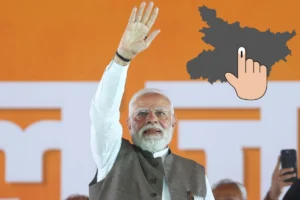
Bharatiya Janata Party
In the complex arena of Indian politics, where dynastic legacies often overshadow meritocracy, the Bharatiya Janata Party (BJP) has emerged as a transformative force, challenging conventional norms with its inclusive approach to governance. With each strategic maneuver, the BJP not only expands its political footprint but also reshapes the narrative of national unity, transcending traditional divides and embracing diversity in its truest sense.
At the heart of the BJP’s inclusive ethos lies its willingness to integrate descendants from a diverse array of political lineages into its fold. The recent addition of figures like Ranjit Singh Chautala, scion of ex-Deputy PM Devi Lal, and Prabhakar Rao, heir to former PM P V Narasimha Rao, underscores the party’s commitment to fostering a broad-based coalition that reflects the mosaic of Indian society.
Yet, the BJP’s inclusivity extends beyond familial ties, reaching out to leaders from disparate political ideologies and regional affiliations. Figures like Neeraj Shekhar, heir to ex-PM Chandra Shekhar, and Naresh Gujral, scion of former PM I K Gujral, have found sanctuary within the BJP or its allied factions, embodying a spirit of collaboration and cooperation amidst ideological diversity.
Moreover, the BJP’s approach stands in stark contrast to the entrenched dynastic politics epitomized by the Congress party. While the latter has long been criticized for its dynastic hegemony, with the Gandhi family looming large over its ranks, the BJP’s proactive stance in embracing leaders from non-Gandhi political legacies signals a departure from such entrenched practices, heralding a new era of leadership based on merit rather than lineage.
Recently, Ajit Singh’s son, Jayant Chaudhary, shifted allegiance from the Opposition INDIA alliance to the NDA ahead of the Lok Sabha elections. This is a remarkable shift. Not too long ago Chaudhary was one of the staunchest critics of BJP and a key ally of the Samajwadi Party-Congress ‘gathbandhan’ in UP. Chaudhary’s father Singh, was the progeny of Janata Party icon and former Prime Minister Chaudhary Charan Singh and founder of the Rashtriya Lok Dal (RLD). He served in Cabinets under both NDA and Congress regimes. His political journey included roles in the V P Singh-led National Front and the Narasimha Rao-led government. In July 2001, he was appointed as the Agriculture Minister in Atal Bihari Vajpayee’s NDA government and later joined the Manmohan Singh-led UPA Cabinet.
The Janata Dal (Secular), led by former Prime Minister H D Deve Gowda, now aligns with the NDA in Karnataka. There is speculation that his son, former Chief Minister H D Kumaraswamy, might join Narendra Modi’s cabinet if they emerge victorious.
Sidharth Nath Singh, a former UP minister and grandson of Lal Bahadur Shastri, has become a prominent voice for the BJP. He was recently tasked as co-in charge of the Andhra Pradesh elections, where the Assembly and Lok Sabha polls are occurring concurrently.
In a recent political move, Vibhakar Shastri, Hari Krishna’s son who once vied for a Lok Sabha seat with the Congress, joined the BJP.
Despite the historical dominance of the Congress and the Gandhi family’s influence, the BJP has been actively recruiting notable individuals from these prominent families, enhancing its reach and asserting its dominance in the national political landscape. This strategy also serves as outreach to the communities and followers of these leaders, as noted by a BJP representative.
Central to the BJP’s inclusive vision is its ideological foundation, rooted in the principles of unity in diversity espoused by its parent organization, the Rashtriya Swayamsevak Sangh (RSS). By embracing leaders from diverse backgrounds and regions, the BJP reaffirms its commitment to representing the multiplicity of voices that constitute the Indian polity, transcending narrow sectarian interests in favor of a broader national unity.
In essence, the BJP’s expanding coalition symbolizes a paradigm shift in Indian politics, where inclusivity, meritocracy, and diversity reign supreme. As the party charts its course forward, it stands as a beacon of hope, offering a vision of governance that celebrates the rich tapestry of India’s political heritage while charting a path towards collective progress and prosperity for all. In the hallowed halls of Indian democracy, the BJP’s inclusive vision shines brightly, illuminating a path towards a more equitable and representative future for the nation.





















